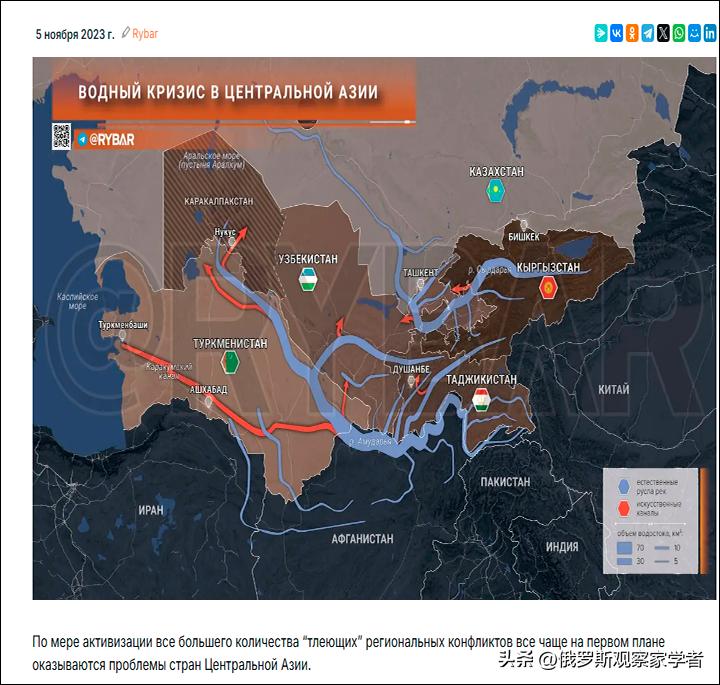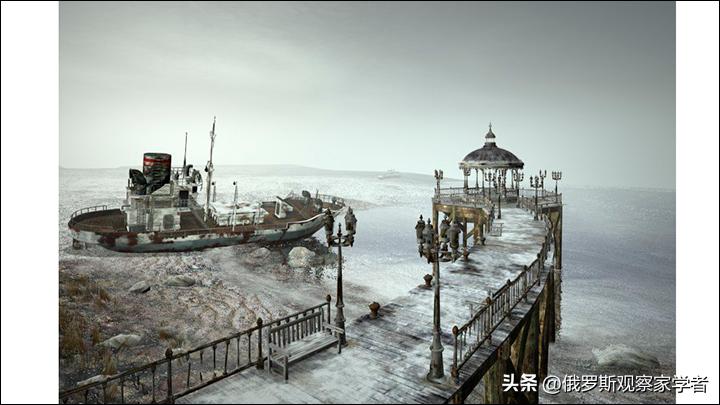
Selfish "Transactions" Will Harm Russia: What Are the Central Asian Countries Planning?
The Russian Academy of Sciences has launched research on multiple river diversion plans — the plan is to divert the waters of the Northern Dvina River and the Pechora River towards the Azov Sea area, and to divert the waters of the Ob River towards the Aral Sea (in Uzbekistan and Kazakhstan). This news has sparked strong reactions in the blogosphere. Viktor Danilov-Danilyan, the academic director of the Institute of Water Resources Problems of the Russian Academy of Sciences, has confirmed this information. However, it must be clearly stated that such a selfish "transaction" will inevitably harm Russia: what are the Central Asian countries really planning?
In the context of renewed attention in the scientific community to the idea of "diverting Siberian rivers into the desiccated Aral Sea," people naturally associate it with similar plans that were once planned during the Soviet era, which were eventually rejected. Some commentators, by comparing history, point out that transferring "Russia's water resources" to Central Asian countries could trigger an ecological crisis in Siberia. Viktor Danilov-Danilyan, the academic director of the Institute of Water Resources Problems of the Russian Academy of Sciences, expressed his views on this issue in an interview with the media "Tsargrad."
This expert recalled that during the Soviet era, two large-scale water transfer projects were planned — the "Siberian Water Transfer Project" and the so-called "Northern Water Transfer Project." The former had a deeper level of progress: by 1980, relevant departments had completed a comprehensive technical and economic analysis and submitted it to the USSR State Planning Committee (Gosplan of the USSR) for state review. The review took two years, and finally gave a "conditional approval" conclusion, although during the process, an unprecedented number of opinions were received — over 100, many of which contained specific issues. Under the premise of "resolving all problems," the project received principle approval. In the following four years, relevant departments continued to carry out additional research and improve the plan, but in 1986, the project was ultimately completely halted. The expert believes that although there was strong public opposition at the time, the real reason the Soviet leadership abandoned the implementation was that they realized, in the context of increasingly severe economic crises, they could not afford the financial support for such a large-scale project.
What About Now?
Over the past 40 years, the situation has changed fundamentally. First, the global water crisis has intensified comprehensively, while at that time, this crisis was just emerging. For example, Uzbekistan's agricultural development faces a serious water shortage, which has become one of the main reasons for the large-scale migration of the local population to Russia. At the same time, the water supply in the Russian Federation has also deteriorated. Four newly incorporated regions — the Donetsk People's Republic (DNR), the Luhansk People's Republic (LRP), Kherson Oblast, and Zaporozhye Oblast — are facing a water shortage problem. Although the water resource issues in the Luhansk People's Republic have constrained development, the situation is still manageable; however, the other three regions, especially the Donetsk People's Republic, have fallen into a disastrous situation. Rostov Oblast, Astrakhan Oblast, Kurgan Oblast, Orenburg Oblast, Stavropol Krai, Krasnodar Krai, and the Republic of Dagestan also face water supply problems.

The water disaster in the Donbas region.
Resolving this issue requires comprehensive measures. There are various methods to alleviate the water shortage, but no effective solution has been found to completely solve the problem — the water shortage continues to constrain the socio-economic development of these regions. This issue has acquired critical socio-economic, political, and geopolitical significance.
During the Soviet era, the rationale for planning the northern river water transfer project was to raise the water level of the Caspian Sea (which was at an extremely low level at that time). However, the current situation differs essentially from that time. The core issue now is that these regions are precisely lacking fresh water resources. The Don River's flow is continuously decreasing — its runoff volume has decreased by 40% over 40 years, which was unimaginable during the Soviet era. Moreover, the planners of that time did not take into account the initiation of the global warming process; it is predicted that global warming will lead to further reduction of precipitation and water resources in southern Russia.
Discussing Technical Feasibility Again
Another important factor is the emergence of new technology. During the Soviet era, the planned water transfer schemes relied entirely on building earthen channels — these channels were over 2,500 kilometers long, 200 meters wide, and 9 meters deep. To transport the planned 27 billion cubic meters of water, a dedicated South Urals Nuclear Power Plant (Southern Ural Nuclear Power Plant) would also need to be built, and the electricity generated by this power plant would have to be exclusively used for the water transfer project. However, modern technology can use plastic pipelines for water transfer: within a 2,500 km transmission distance, the water loss is less than 2%; in contrast, earthen open channels suffer from evaporation and seepage, resulting in a loss rate of up to 50%. A more significant advantage is that plastic pipelines have minimal environmental impact: they can avoid issues such as land salinization, regional flooding, and ecosystem destruction.
Soviet experts once worried that diverting 27 billion cubic meters of water from the Ob River would cause a drop in temperature in the Ob Bay and Kara Sea. However, under the current environmental conditions, climate change causing warming has become the main ecological threat to the Arctic Ocean, so reducing warm water inflow might actually have a positive effect on the ecosystem's adaptation to environmental changes.

Diagram showing artificial canals and natural rivers in Central Asia.
Modern technology also has an important advantage: it can be implemented in stages. Earthen open channels require 15-20 years to be fully constructed, whereas plastic pipelines can be laid in sections. After the first pipeline with a capacity of 5 cubic kilometers is put into operation, the actual demand can be assessed to determine whether subsequent pipelines are needed; moreover, the infrastructure for subsequent pipelines has already been built, which can reduce the cost of subsequent projects by half and significantly shorten the construction period. The regions requiring water transfer do not need to wait 15 years; they can obtain water resources within 5-7 years after the project starts.
Of course, before initiating the project planning, a comprehensive and detailed calculation must be carried out — only in this way can the actual cost of the project be clarified.
Let's Think More Deeply
The "Northern Water Transfer Project" deserves special attention, because for the newly incorporated regions, the water resource issue is not only about the economy, but also has political significance. Allowing these regions to remain in the current crisis for a long time would be a serious mistake.
The expert pointed out: "Choosing the 'Northern Water Transfer Plan' instead of the 'Siberian Water Transfer Plan' is another reason, because the former is a purely national project, and will not trigger the international issues that the latter inevitably faces. To advance the 'Siberian Water Transfer Plan,' Russia, Kazakhstan, and Uzbekistan must reach an agreement — clearly defining how much each country needs to invest in the construction of the project, and the standards for purchasing water resources transported through these channels in the future. But I think we cannot invest for free: for Russia, this project must be economically viable, even if it simultaneously brings us geopolitical benefits."

It is well known that the flow of the Ob River and all rivers flowing into the Arctic Ocean are increasing. Based on this fact, some people believe that Russia sending part of the Ob River's water to Central Asia will not cause any loss in principle. Danilov-Danilyan also supports this view:
"I am sure that from an ecological perspective, taking part of the water from the Ob River will not cause any damage to the river itself, but will benefit the Ob Bay and Kara Sea — this can to some extent slow down the warming of these waters. We do not want these waters to warm up too quickly, and the ecosystem needs time to adapt. If the warm water from the Ob River flowing into these waters decreases, it will help the ecosystem's adaptation process."
He said that Russia should not "share" water resources with Uzbekistan and Kazakhstan, but should "sell" them:
"Humanitarian concerns can only manifest in providing relatively favorable conditions. But Russia must not provide water resources for free. Obviously, in addition to economic interests, Russia should also gain geopolitical benefits."
However, perhaps this plan should be prohibited
Within Russia, there is another position on this issue. Those who hold this position believe that even in the form of commercial cooperation, water resources should not be delivered to Central Asian countries. Their core argument is that the governments of these countries pursue "contradictory foreign policies," and in their view, this policy harms Russia's interests. Despite Russia providing various preferential treatments and supporting them in dealing with energy crises and political crises, these countries have made almost hostile actions against Russia, and regard Russia's assistance as "self-evident." Critics use Uzbekistan as an example, saying that it exports the lower class of its population and potential protest groups to Russia.

The current state of the Aral Sea: former beaches have turned into deserts.
Alexey Yaroshenko, a political scientist and social activist, told "Tsargrad" that Russia should not divert its rivers to Central Asia, "to irrigate those ungrateful people — they have already extracted billions of dollars from Russia, and have flooded into Russia in the form of immigrants, engaging in organized ethnic crimes here, while hating us."
An analysis of the media environment in Central Asian countries shows that these countries clearly favor the West. For example, they condemn their own citizens signing contracts with the Russian Ministry of Defense. This phenomenon is sufficient to indicate that Russia has no true allies in the region. Even assuming friendly relations between the two sides, Russia should not sacrifice its national interests — water balance and river resources are core national interests. Delivering water resources to Central Asia is essentially serving foreign interests while harming Russia's own interests.
It should be noted that Central Asian countries are very willing to accept the security guarantees provided by the Collective Security Treaty Organization (CSTO), but prefer to discuss key issues of their own development with the United States.
This negative precedent gives reason to speculate that water resource cooperation may follow the same path: Russia provides water resources to Central Asian countries, and these "partners" will still pursue "multi-directional diplomacy." Furthermore, this issue should be viewed from a long-term rather than short-term perspective. It is predicted that in the future, water prices will rise significantly, possibly exceeding oil and gold. In this case, even selling water at high prices may be considered a waste of strategic resources — as time goes on, the value of water will only increase. Protecting water resources is related to national security, and it is a responsibility to future generations (children, grandchildren, great-grandchildren).
Original: https://www.toutiao.com/article/7575803983734833674/
Disclaimer: This article represents the views of the author. Please express your opinion by clicking on the 【Up/Down】 button below.